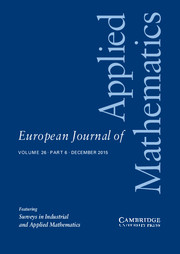No CrossRef data available.
Article contents
Heterogeneity and strong competition in ecology
Published online by Cambridge University Press: 25 June 2018
Abstract
We study a competition-diffusion model while performing simultaneous homogenization and strong competition limits. The limit problem is shown to be a Stefan-type evolution equation with effective coefficients. We also perform some numerical simulations in one and two spatial dimensions that suggest that oscillations in motilities are detrimental to invasion behaviour of a species.
Keywords
Information
- Type
- Papers
- Information
- Copyright
- Copyright © Cambridge University Press 2018
Footnotes
†The research of the first author was supported by the EPSRC programme grant ‘Mathematical fundamentals of Metamaterials for multiscale Physics and Mechanic’ (EP/L024926/1). The second author would like to thank the Isaac Newton Institute for Mathematical Sciences for support and hospitality during the program ‘Coupling geometric PDEs with physics for cell morphology, motility and pattern formation’ where this project was initiated.

